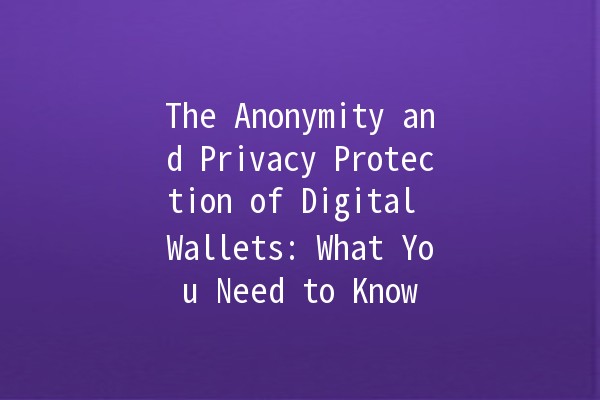
In recent years, digital wallets have transformed the way we conduct transactions and manage our finances. With the growing reliance on these technologies, concerns regarding anonymity and privacy protection have become increasingly important. In this article, we will dive deep into the nuances of how digital wallets protect user anonymity and privacy, as well as offer practical tips to enhance your security when using these platforms.
Understanding Digital Wallets

Digital wallets, also known as ewallets, are software applications that allow users to store payment information and passwords for numerous payment methods and websites. Users can make transactions through their smartphones or computers, providing convenient and often secure alternatives to traditional cash or cards.
Key features of digital wallets include:
Convenience: Users can make purchases without needing physical cash or cards.
Security: With advanced encryption and tokenization, digital wallets can offer a level of security that reduces theft risks associated with physical wallets.
Tracking and Management: Many wallets allow users to monitor spending habits and manage finances in realtime.
Why Anonymity Matters
When using digital wallets, many users worry about the potential for identity theft or unauthorized surveillance of their transactions. Here are several reasons why anonymity is vital in this digital landscape:
ancial Privacy: Users want to keep their financial transactions private to avoid unwanted attention or targeting by advertisers.
Protection from Fraud: Anonymity can help guard against fraud and identity theft by obscuring users’ personal information during transactions.
Regulatory Compliance: In some jurisdictions, laws and regulations may require a degree of transaction anonymity to safeguard individual privacy rights.
How Digital Wallets Provide Anonymity
Digital wallets employ various technologies and strategies to maintain user anonymity:
Enhancing Your Digital Wallet Privacy
While digital wallets come with builtin privacy protections, users can take further steps to enhance their security. Here are five practical tips:
Explanation: A strong password combines letters, numbers, and symbols, making it difficult for hackers to guess. Twofactor authentication (2FA) adds another security layer by requiring a second form of identification.
Application: Whenever you set up a digital wallet, choose a complex password that is unique to that wallet and enable 2FA. This additional verification step ensures that even if your password is compromised, unauthorized users still cannot access your account.
Explanation: Keeping track of transactions can help you identify any unauthorized purchases quickly.
Application: Set aside time weekly to review your transaction history within your digital wallet. If you notice any unfamiliar activity, report it to the wallet provider immediately to mitigate potential fraud.
Explanation: Instant notifications about account activity keep you informed of any unauthorized transactions.
Application: Most digital wallets allow you to customize notification settings. Optin for alerts regarding purchases, changes to account settings, or unusual login attempts. This proactive approach ensures you remain aware of your account's activity.
Explanation: Sharing personal information increases your vulnerability.
Application: Be cautious about which apps and services you allow to connect with your digital wallet. Many applications request access to your data for various reasons, but you should limit access to only necessary services. Regularly review app permissions and revoke access when not needed.
Explanation: Software updates often include critical security patches that protect against vulnerabilities.
Application: Regularly update your digital wallet application, mobile operating system, and any related software. Set your devices to automatically install updates when available to ensure you are always protected against the latest security threats.
Common Concerns Regarding Digital Wallet Privacy
Digital wallets utilize advanced encryption methods to keep your personal information secure. However, it is always essential to follow best practices for account security, such as using strong passwords and enabling twofactor authentication.
If your digital wallet is compromised, contact the provider immediately to secure your account. Many wallets have customer support dedicated to resolving potential fraud issues. Additionally, monitor your financial accounts closely for unusual activity.
While many digital wallets provide options for anonymity, full anonymity is challenging due to regulatory requirements in various regions. However, using wallets that allow minimal personal information disclosure can help enhance your anonymity.
Yes, most digital wallets do keep records of transactions to facilitate service enhancement and fraud prevention. However, individuals looking for higher anonymity should consider wallets that prioritize user privacy and do not track transaction histories.
Consider using cryptocurrencies within digital wallets that emphasize decentralization and privacy, such as Monero or Zcash. These currencies typically have builtin privacy features that help obscure transaction details.
Each digital wallet may have its fee structure, often including transaction fees, withdrawal fees, or inactivity fees. Always review the fee structure associated with your chosen wallet before making transactions.
Navigating the landscape of digital wallets and privacy protection can be daunting, but with the right knowledge and practices, you can enhance your security and enjoy the benefits of this technology. By understanding how these wallets work and implementing effective privacy strategies, you can ensure that your financial information remains secure while benefiting from the convenience of digital transactions. Stay vigilant, informed, and proactive to protect your anonymity in this digital age.
Implementing these strategies can empower you to navigate the world of digital wallets with greater confidence and security, ensuring that your financial privacy remains intact.

